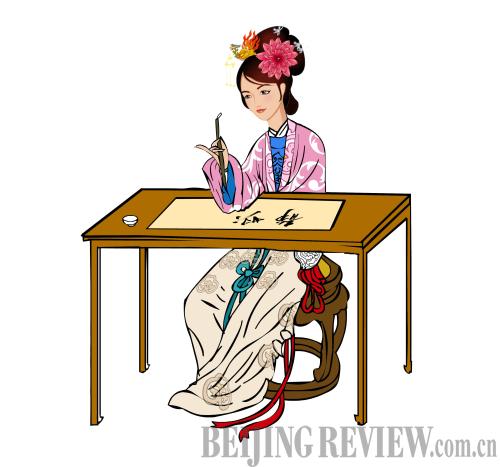|
 |
|
(LI SHIGONG) |
"Many foreigners mistakenly believe that Chinese women are creatively oppressed, that they have been oppressed for centuries," Teacher Yang said, glancing at me wryly.
"That's correct," I replied, lifting my eyebrows. "Can you disprove it?"
"Of course," he said, smiling. "I cite my case by calling on Yuan Mei (1716-97), one of China's foremost poets of the 18th century. He was a key promoter of women's literary writing. Yuan had many unconventional ideas regarding women. His position caused intellectuals to revaluate the way women were perceived—both as literary talents and as fellow human beings."
"Many ancient Chinese female poets existed?" I asked.
"Of course," he replied. "Female literary activity blossomed in the late Ming (1368-1644) and early Qing (1644-1911) dynasties. Some male Ming poets, such as Zhong Xing (1574-1624), felt that women were actually better poets than men. Yuan and Chen Wenshu (1775-1845) promoted women who wrote classical verse. This, in effect, also began a paradigm shift in thinking about women's lives—from concubines to foot binding."
"Can you elaborate on this a little, please?" I asked my friend.
"Certainly; more crucial to the idea of women poets is this paradigm shift: The traditional Confucian concept held that 'a woman without talent is virtuous.' Literacy was thought harmful to femininity. But during the Ming period more females learned to read, and they often chose classical literature, which in turn led them to try their hands at writing poetry. Yuan and other poets supported this trend; it's said that more females wrote more poems in the 18th century than in the 20th."
"So poems lead to women's rights?" I asked.
"Literacy leads to knowledge and knowledge promotes positive change. Ancient courtesans wrote poems, then aristocratic women wrote poetry; this changed male attitudes toward women. The radical Ming thinker Li Zhi (1527-1602), for example, argued that women were the intellectual equals of men. But it is Yuan who is most on my mind to tell you about today."
"He certainly sounds like an interesting guy, a man who liked women," I said.
"Indeed," replied Teacher Yang. "He was brought up in a household of women, and babied by his mother and grandmother. His sisters and his cousin were Yuan's first literary disciples. He was also quite devoted to his family, especially his mother."
"Perhaps his close relationships in mentoring female relatives influenced him, along with his harmonious relationships with women in his family?" I commented, watching Teacher Yang's face.
"Indeed," Yang replied, smiling happily. "For no house, anywhere in the world, is amicable without having harmony among the women. Although his relatives were his first students, his interest in women's verses grew and grew. For this, Yuan was attacked by his contemporaries. But Yuan continued to support female literary writings. He published, at his own expense, the works of two sisters, Yuan Ji and Yuan Shu. He frequently corresponded with women writers, and inscribed painting that they sent him."
"What was the Confucian dictate about women that discouraged literacy and creativity?" I asked.
"'Words should not pass outside the women's quarter' is one," replied Teacher Yang. "'Women were to be quiet and still.' But one woman, named Zhou Yuezun, conducted a very lively correspondence with Yuan. She regarded him as her mentor, and she is only one of many of his female disciples."
"Why did Yuan go against the norm and help women develop their talent?" I asked.
Teacher Yang replied: "I cannot be sure, but perhaps it has to do with his literary theory of Nature and Inspiration. Yuan asserted that true poetry derives from nature and feelings. He recognized that everyone possesses unique nature and feelings, hence even illiterates could possibly create poems. He understood that oppressed women are potentially men's equals; he felt that women could create equal or better poetry than men. Perhaps his close relationships with the females in his family were crucial to his thinking."
"I'm sure he enjoyed the admiration females gave him as well," I commented.
"I agree with you," Teacher Yang responded with a smile.
The writer is an American living in Beijing
| 